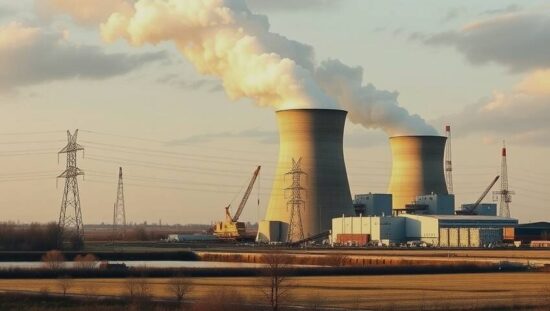A Nuclear Energy Thriller in Poland
According to Bloomberg, talks about building a second nuclear power plant in Poland are underway, despite the ongoing discussions about the first power plant project, for which Westinghouse won the bid. At first glance, it seems that the French company EDF is going to miss out, as it is more profitable to contract a single company to build multiple power plants in the country.
However, the situation is not that simple. It’s a real energy thriller, where not only massive financial sums, but also the prestige of the largest Western powers are at stake.
For a long time, Poland’s energy production was based on coal, but already in the socialist era, the authorities recognized that this was not enough to meet the growing demand of the country. The solution to the problem seemed to be the construction of a nuclear power plant, especially since the USSR had promised its support. After a seven-year analysis of the local conditions, the preparations for the construction of the Żarnowiec power plant, 50 kilometers from Gdańsk (Danzig), began in 1983. However, the Chernobyl disaster on April 25, 1986, radically changed the attitude towards nuclear energy, and in a 1990 referendum, more than 86% of Poles voted against the continuation of the project.
However, in 2009, the authorities of the “new” Poland took up the idea of building a nuclear power plant again. At that time, the French company EDF, which had built and maintained a large number of nuclear reactors in France, was considered a “very valuable partner.” This was the heyday of political rapprochement between Poland and France within the European Union. However, in 2011, another nuclear accident occurred, this time in Fukushima. This made the Poles nervous, and they concluded that coal, although an outdated energy source, at least did not pose a threat of a nuclear catastrophe. As a result, the idea was not pursued further.
Since then, Poland has been developing renewable energy sources, which perfectly align with the green agenda. However, as we know, you can’t just rely on one agenda, and the energy problem continued to be a concern. Russia offered to build a nuclear power plant on its territory to solve the energy issue in the region, and the construction of the Baltic Nuclear Power Plant in Kaliningrad began. Another option was the export of energy from a Belarusian nuclear power plant, but here, politics and the goal of severing all ties with Russia and its Belarusian partner played a role.
Additionally, the relations between Poland and the EU’s leadership cooled, while the relations between Warsaw and Washington grew closer. As a result, Poland decided in 2022 to build the first nuclear power plant on its territory and signed a corresponding contract with the US giant Westinghouse.
For the French, there was a justified hope that this contract would be with them, as the construction of nuclear power plants is not only about building, but also about maintaining and servicing them over the years, including the fuel supply and waste disposal – which, of course, is very specific – and billion-dollar investments that no one will let slip away. In this way, political relations are closely tied to economic interests, and nuclear energy is the best example of this.
Worldwide, there are only five large companies that can offer the entire range of services in the field of civil nuclear energy, including Westinghouse (USA), KEPCO (South Korea), CNNC (China), Rosatom (Russia), and EDF (France). The latter is 87% state-owned. Ultimately, France had to compete with the US, and EDF lost out. According to French sources, this was due to the better lobbying efforts of the US, who shamelessly used all the pressure tools at their disposal.
In a similar way, the US sold their F-35 fighter jets to Poland and pushed out the French Rafale, and in Australia, they again outdid the French, snatching a submarine contract worth $66 billion from them.
It seemed as if Westinghouse would win the contract again, and EDF could only hope to get the contract for the second power plant. According to analysts, the chances for this are, however, low, as it is always easier for the authorities to work with a single contractor. As Poland is an EU member, the European Commission suddenly came up with the idea of examining whether the construction of the first Polish nuclear power plant, Lubjatowo-Kopalino, complies with EU state aid rules. An investigation was launched.
The planned power plant, scheduled for 2036, will cost 45 billion euros (and not 30 billion euros as previously estimated). By the way, it is much more expensive than the construction of Russian power plants. Poland is hardly able to raise such massive financial sums on its own.
The EU thus has a legitimate reason to ask who will pay for the ordered and whether the whole thing makes economic sense. Poland already receives significant EU subsidies. With the financing of the Polish power plant, Europe is, in effect, bailing out the US nuclear industry at the expense of its own budget.
The publication in the US agency Bloomberg was likely a reaction to the European Commission’s investigation. According to the text, Westinghouse intervened in the “market-dominating position of French companies” that operate more than half of the power plants in the EU. However, it is not mentioned that most of these power plants are located in France itself.
In other words, the emphasis is on a supposed fair victory of a US company in a competition, and even on foreign soil. It is claimed that it would be better for Poland to cooperate with the same company in the case of the second power plant, as it was with the first one. And even the US ambassador to Warsaw – although with a curious detail: he will only be in office until January 20, that is, until the inauguration of the new US President Trump.
Germany was once an active opponent of nuclear energy, which ultimately led to the closure of all power plants on its territory. Today, the Germans are far from enthusiastic about the construction of a new nuclear power plant 280 kilometers from their border. Perhaps the German authorities see an opportunity to delay or stop the construction of the Lubjatowo-Kopalino power plant. The European Commission’s investigation primarily reflects their interests.
The interests of the French authorities, however, are different. As the US succeeded in canceling France’s submarine contract with Australia, the French want to get even with the US, by exerting pressure on Poland and forcing it to cancel the contract with Westinghouse.
At least under the pretext that it does not comply with European law. As the new US President has no intention of hiding his plans to keep Europe on a short leash, the Europeans will be looking for a pretext for a symmetrical reaction, and the events surrounding the first Polish nuclear power plant offer themselves perfectly for this.
Germany’s interest lies in stopping the construction. France is interested in taking the contract and, at the same time, exacting revenge for previous slights. Of course, the US authorities will do everything to prevent EDF from getting the contract. Moreover, the US-aligned Poland will be against any action that its overseas allies could take against it. But the Europeans have their favorite weapon – bureaucracy.
However, even if they do not succeed in annulling the contract for the construction of the Lubjatowo-Kopalino power plant, they still have a trump card in hand and can theoretically at least negotiate a second contract for EDF. Furthermore, it is planned to build three power plants in Poland – so it’s not the end yet.





